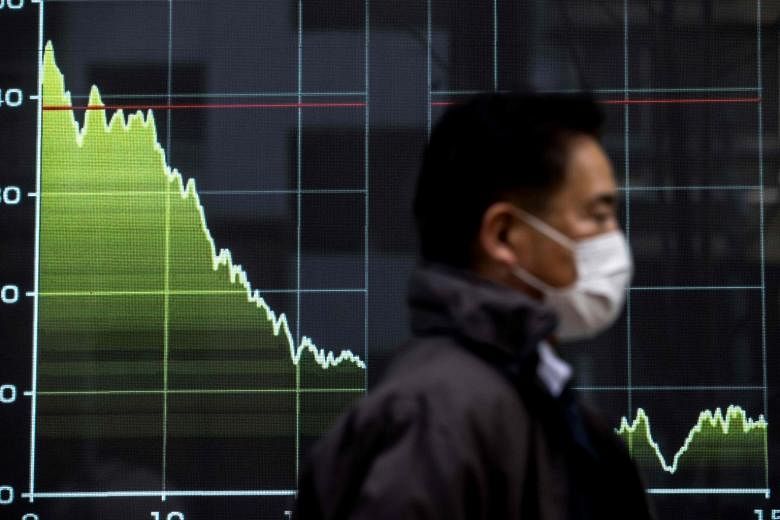
SINGAPORE - Stock markets across Asia were a sea of red, while oil prices hit seven-year highs amid the threat of a full-scale invasion of Ukraine by Russia.
The repercussions from likely sanctions from the West, even higher energy and commodity prices and more hawkish monetary policy measures could disrupt the global economic recovery from the Covid-19 pandemic.
The Straits Times Index (STI) lost 35.78 points, or 1.04 per cent, to close at 3,400.58 on Tuesday on a sell-off in US futures.
This came after Russian President Vladimir Putin recognised two breakaway regions in eastern Ukraine as independent, ordered forces into the area, and likely torpedoed a last-minute bid for a summit with US President Joe Biden.
Mr Biden was set to order retaliatory sanctions on the separatist regions of Ukraine, with the European Union vowing to take additional measures.
Brent crude futures jumped to a high of US$97.40 a barrel - their highest since September 2014. Natural gas was up nearly 7 per cent to US$4.74 per million British thermal units.
“There’s fear in the local market but not panic selling. Even though some took profit, optimism over local banks’ earnings helped offset some of the geopolitical risk,” CIMB Private Banking economist Song Seng Wun said.
DBS Bank, OCBC Bank and UOB, which maintain a combined 45 per cent weight in the STI, have averaged 16 per cent gains so far this year, on recent expectations of five to seven interest rate hikes by the US Federal Reserve this year. This compared with the trio averaging 25 per cent total returns in 2021, according to a Singapore Exchange market update on Monday.
So far this year, Singapore stocks have drawn $1.9 billion in net institutional inflow, with DBS, OCBC and UOB accounting for a combined $1.4 billion of that amount, the update said.
Mr Song added: “While we are worried about supply disruptions because of the Ukraine crisis, oil prices haven’t breached US$100 a barrel yet because of the possibility that international talks could lead to a lifting of sanctions on Teheran, which could put more Iranian oil in the market.”
But some analysts say oil prices are likely to remain volatile in the near term because Iranian crude is unlikely to return until later this year.
Meanwhile, the worst performers yesterday included Singapore Airlines and Dairy Farm, which shed 2.4 per cent each, and Yangzijiang Shipbuilding, which lost 2.86 per cent.
“These stocks, which are a proxy for economic recovery, did poorly as the prospects of an invasion and higher energy prices can threaten the global recovery,” said Mr Colin Low, assistant manager, research and portfolio management, FSMOne.com.
https://news.google.com/__i/rss/rd/articles/CBMifmh0dHBzOi8vd3d3LnN0cmFpdHN0aW1lcy5jb20vYnVzaW5lc3MvY29tcGFuaWVzLW1hcmtldHMvYXNpYS1zdG9ja3Mtc2xpZGUtb2lsLWp1bXBzLWFzLXJ1c3NpYS1vcmRlcnMtdHJvb3BzLXRvLXVrcmFpbmUtcmVnaW9uc9IBAA?oc=5
2022-02-22 14:05:42Z
1290197942
Tidak ada komentar:
Posting Komentar